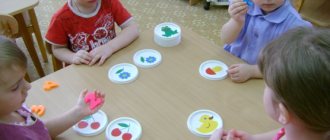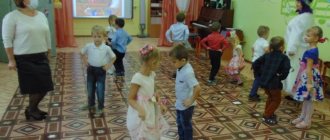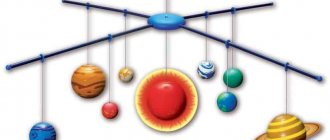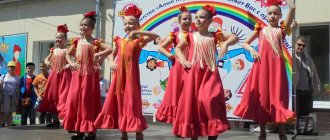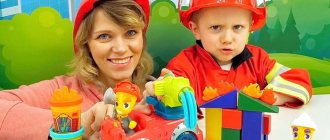Entertainment for the holiday "May 9" for children of the middle group
Entertainment for May 9th for children of the middle group.
Target:
Development of cognitive interest in the history of their country, formation of patriotic feelings in children. Fostering a sense of pride in the heroism of our people. Encourage the desire to imitate the courage, dexterity, courage of the defenders of the Motherland, cultivate the desire to be like them.
Preliminary work:
conversations, looking at illustrations and albums about the Second World War. Reading fiction.
Materials:
exhibition of illustrations of military equipment, balls, skittles, dressings, 4 boards, 2 benches, 2 arches, 2 hoops, 2 flags, 2 envelopes.
Progress of the event
To the music, children enter the music room.
Educator:
Guys, do you know what holiday is approaching soon?
(children's answers).
The holiday of Victory Day in the Great Patriotic War is approaching.
VICTORY DAY
The May holiday - Victory Day is celebrated by the whole country. Our grandfathers put on the Military Orders.
In the morning the road calls them to the solemn parade. And thoughtfully from the threshold the grandmothers look after them. (T. Belozerov)
Many years ago, on June 22, 1941, a terrible enemy attacked our country. It happened early in the morning when all the people were sleeping. Nobody expected this attack. Adults worked, children went to kindergarten and school. In an instant, peaceful life ended. Having attacked suddenly, the Nazis were able to advance a long distance into the interior of our country. Explosions thundered all around, cities and villages burned with fire. The entire Soviet people rose to defend their Motherland. Men went to the front to fight, and women continued to work day and night in factories and factories: sewing overcoats, knitting warm mittens, socks, baking bread...
You guys probably know that different types of troops took part in the Great Patriotic War (ground forces, air force, navy).
I want to invite you to an exhibition of military equipment.
Children look at illustrations of military equipment.
Guys, did you recognize any cars?
Children's answers:
Educator:
Well done, now answer me:
- What kind of formidable machine is that will pass both on land and on water? (Tank) Who controls the tank? (tankman)
—Who controls the warship? (captain)
—Who guarded and is now protecting our sky? (pilots)
—What does a soldier carry on his shoulder? (machine)
—What protects the artilleryman’s head? (helmet)
—Who guards the borders of our Motherland? (border guards)
Educator:
Girls nurses showed considerable courage and bravery during the war. They had to carry the wounded straight from the battlefield, when explosions thundered around and bullets whistled overhead. I suggest our girls try themselves as a nurse and go to a military hospital.
The competition “Help the Wounded” is being held. Two pairs of girls take part, one is wounded, the other provides assistance (rewinds her arm).
Educator:
Well, our girls are real nurses. Are our boys ready to become real soldiers? I suggest you now turn into gunners and try to shoot down the enemy plane.
P/n. "Shoot down an enemy plane." Children are divided into two teams. Game with pins.
Educator:
Well done! You are a sharp shooter. Now let's find out who is the smartest.
P/n. "Crossing". 2 teams are participating. Participants move to the other end of the hall along two boards, rearranging them one after another.
And in the next test we will find out who is the fastest. After all, signalmen must very quickly transmit important information to military headquarters.
P/n. "Deliver the telegram." On a special command, the participants grab the envelope and run to the chair, returning and passing the envelope to the next player.
Well done. Now we know that our guys are brave, dexterous, accurate, and they can be entrusted with a responsible and important task - to hoist the flag.
P/n. “Get to the flag.” On command, participants overcome obstacles (bench, arc) to reach the flag. They just run back. Then the next participant runs.
Educator:
Guys, you are all great. Everyone tried very hard to complete the tasks. Now let’s rest a little, sit down on the chairs.
Thanks to common efforts, our Army drove the enemy from our land. The war has died down, the long-awaited peace has come to earth. Many soldiers did not return home from that war. May 9, 1945 has forever become a great date for Russia. We will never forget those who burned in tanks, who threw themselves from the trenches under hurricane fire, who lay down with their chests on the embrasure, who did not spare their lives and overcame everything. Not for the sake of awards, but so that you and I, guys, can live, study, work and be happy.
WE NEED PEACE
Everyone needs peace and friendship, Peace is more important than anything in the world, On a land where there is no war, Children sleep peacefully at night. Where the guns don't thunder, the sun shines brightly in the sky. We need peace for all the guys. We need peace on the entire planet!
(V. Stepanov)
To pay tribute to those who died in the Great Patriotic War and to show the power of our country, for many years all military personnel and veterans have been participating in the festive parade. I suggest you go to the parade too.
To the march “Farewell of the Slavic Woman,” children march and perform movements with flags.
So that no one forgets the valiant heroes and their exploits, many monuments were built throughout the country in memory of the war heroes. Also on this day, people lay wreaths and flowers at the monuments. Usually they are brought to the “Eternal Flame”, which burns in every city so that people never forget how terrible war is. We have such a fire in our city too. Victory Day ends with festive fireworks.
WHAT KIND OF HOLIDAY?
There are festive fireworks in the sky, fireworks here and there. The whole country congratulates the Glorious Veterans. And the blooming spring gives them tulips, gives them white lilacs. What a glorious day in May?
(N. Ivanova)
(The children leave the music room to the music).
Golubosh I.V. teacher
Age group: middle preschool age. 45 years. Integration of educational areas: “Speech development”, “Cognitive development”, “Socio-communicative development”, “Artistic and aesthetic development”, “Physical development”. Project participants: Children of middle preschool age, parents (legal representatives), educators, music director, and physical education director participate in the implementation of the project. Project implementation period: Short-term Project is being implemented from March 20, 2019. until May 20, 2020 Type of project: Cognitive, creative, socially significant By degree of participation: Group Types of children's activities: Playful, communicative, perception of fiction, visual, cognitive - research, motor.
Relevance
2022 marks a significant date - the 75th anniversary of Victory in the Great Patriotic War. Patriotic education of the younger generation has always been one of the most important tasks of modern society. Childhood is the most fertile time for instilling a sacred feeling of love for the Motherland. Patriotic education means the gradual formation in children of love for their Motherland and constant readiness to defend it. The creation of the project “Let us bow to those great years” is aimed at instilling in preschoolers a sense of pride in their people, respect for their achievements and worthy pages of history, involves involving children and parents in studying the significant dates of the Great Patriotic War of 1941-1945 and participating in events on the preparation and celebration of the 75th anniversary of the Victory. Target
Goal: Formation of ideas about the Great Patriotic War (raising patriotic feelings in preschool children) on the basis of existing ideas about war, preserving the continuity of generations, forming in preschoolers respect for the military history of Russia, civic positions, instilling patriotism and a sense of pride for their Motherland. Educational objectives:
- To form an idea of the history of the Second World War using various types of activities;
- Arouse interest in the past of our city, region, country;
- Introduce the course of military operations during the Great Patriotic War and the hero cities;
- Show the courage and heroism of people during the Great Patriotic War; Educational:
- Develop perception of works of literature, painting, music;
- Learn to express your feelings, enrich your vocabulary;
- Develop a sense of teamwork; Educational:
- To cultivate spiritual, moral and patriotic feelings, pride for one’s country, love and caring attitude towards the older generation. careful handling of family photographs and awards
Project implementation stages
Stage 1: Preparatory: (informational - cumulative, organizational)
- project development; definition of the project problem;
- setting goals and objectives;
- determination of the main forms of work;
- collection of information, literature, additional materials;
- work on drawing up stages and a plan for project implementation;
- stage: Main (practical) - implementation of the project 3.stage Final (summarizing) Excursion: to the obelisk, laying flowers to the fallen heroes of the Second World War, creating albums on military themes. Carrying out the musical festival “This Glorious Victory Day”
Product
- Methodological material about the Great Patriotic War, stands, screens, booklets about the Great Patriotic War
- Albums on military topics: “Military equipment” “They fought for the Motherland” “Cities are heroes”
- “Exhibition of drawings on military themes” 4. Participation in Promotions
- Musical festival “This Glorious Victory Day”
Project problem: The modern generation knows little about the Great Patriotic War and a patriotic feeling does not arise on its own. This is the result of a long, purposeful educational influence on a person, starting from childhood. In this regard, the problem of moral and patriotic education of preschool children becomes one of the most pressing.
Main forms of project implementation Excursions; GCD; conversations; viewing presentations and videos about the war; mini-exhibitions; writing stories; physical education; consultations for parents.
Interactions with parents
- Design of information stands in the middle group of preschool educational institutions: “We cherish the memory”
- Holding an exhibition and creative works of children and parents
- Develop instructions for parents “What to tell children about the war?”
- Design a folder - move “Read to the children”
- Creating a corner in the group “No one is forgotten and something is not forgotten”
- Participation in promotions
Expected outcome of the project
Pupils: 1. Children's knowledge about the Great Patriotic War has been expanded.
- A respectful attitude has been formed towards war participants, home front workers, and careful attitude towards family photographs and relics (medals, orders, etc.)
- Continue to develop the moral and patriotic qualities of students.
- The implementation of this project involves updating and enriching senior groups with teaching materials and multimedia products dedicated to the 75th anniversary of Victory in the Great Patriotic War.
Parents: Active and interested participants in the project; Focused on developing the child’s need for cognition, communication with adults and peers, through joint project activities. Teachers: Carry out innovative activities, Improve their professional level.
Work with children
| No. | Direction | Event theme | Form of conduct |
| 1. | "Physical development" | Organization and holding of military-sports and patriotic events: - physical education "We are the future defenders of the Motherland" fun game "Hit the target." Outdoor games: “Obstacle course”, “Grenade throwing”, “Fire in the trench!”, “Falcon fight”, “Dragon”, “Salute”, “Catch the saboteurs”, “Crossing”, “Pilots to the airfield!” "Aircraft" | Physical education leisure time “At the end of the day the soldiers marched”, health day, outdoor games, relay races, fun games. marathon. |
| 2. | "Social and communicative development" | Role-playing games: “Defenders of the Motherland”, “Bandage the Wounded”. "Emergency". “Lay out a figure” (lay out a tank, a rocket, an airplane, etc. from counting sticks), “Guess what kind of military equipment I have in mind?” (like a “Yes-No” game). Game “Defending the Motherland”, “Soldiers”. Acquaintance with state symbols. Campaign: “St. George’s Ribbon”, “We Carefully Preserve the Memory” | joint educational activities in special moments, role-playing games, director's games, didactic games, dramatization, work with parents |
| 3. | "Cognitive Development" | Conversations about the war, front-line soldiers, children of the war: “War and Peace”, “Victory Day” “What is heroism”, “At a rest” (conversations about military professions), Examination of illustrations about the war Viewing presentations: “The Great Patriotic War”, “ Let us not forget their great feat!” “The war took away my childhood.” Viewing of cartoons with discussion: “A Soldier’s Tale” (TO “Kievnauchfilm”), “Soldier’s Lamp” (TO “Ekran”), “Memory” (Soyuzmultfilm), “The Legend of the Old Lighthouse” (Soyuzmultfilm), “Cornflower” (“Soyuzmultfilm”), Logic game “Which path should the border guard take to get to his unit?” Logic game “Find the differences” (comparing two pictures: find similarities and differences). Didactic game “Time Travel” (weapons from the past to the present day). | Organized educational activities Educational activities during regime moments. Collaboration with families. |
| "Speech development" | Creative task “Guess who these boys want to become?” Guessing riddles about military equipment and weapons. Reading works of fiction: L. Kassil “Monument to a Soldier”, “Your Defenders”; S. Baruzdin “Stories about War”; S. Mikhalkov “Victory Day”; S. Alekseev “First Column”, “First Night Ram”; E. Blaginina “The Overcoat”; L. Kassil “Monument to the Soviet soldier”; M. Plyatskovsky “May of forty-five”; A. Tvardovsky “The Tankman’s Tale”; A. Mityaev “Bag of Oatmeal” “Our Weapon”, etc. Learning poems for Victory Day: S. Marshak “Let there never be war”; V. Kosovipky “Future Man” Compilation of stories: based on a set of military-themed toys, military professions, Excursion to the Victory Museum in a preschool educational institution Visit to the library Conversation about the army in peacetime. Learning proverbs and sayings about the army. Reading competition “Lines scorched by war.” | Organized educational activities Educational activities during regime moments. Collaboration with families. | |
| 4. | "Artistic and aesthetic development" | Drawing on the theme “Military equipment”, “A world without war” (collective work), “Planes are flying”, “Fireworks”, “Tank” Modeling on the theme “Tank”, “Airplane” Manual labor “airplane”, “tank” Dove of Peace” Making family holiday cards for Victory Day Examining reproductions of paintings: “Ilya Muromets” (art. K. Roerich); “The Knight at the Crossroads”, “Bogatyrs”, “Victory Parade” (M.I. Samsonov); “Parade on Red Square in Moscow on November 7, 1941” (K. Yuon); Examination and discussion of posters: “Warrior of the Red Army, save!” (artist V. Koretsky); “The Motherland is calling!” (I.M. Toidze) “Letter from the front” (A. Laktionov); Vernissage of children's creativity “Fireworks over the city in honor of the Victory!”, “We vote for peace!”, “No one is forgotten, nothing is forgotten,” “Heroes of the Russian Land.” Musical lounge “Acquaintance with songs of the war years.” Musically rhythmic exercises to music: “Airplane” (V. Tilicheeva), “March of the Wooden Soldiers” (P. Tchaikovsky). Listening to an excerpt from the play “The Heroic Gate” (musical work “Pictures at an Exhibition”) by M. Mussorgsky D. Trubachev, V. Trubachev “My Grandfather”, “My Motherland”, K. Ushinsky “Our Fatherland”. Learning: D. Trubachev, V. Trubacheva “We walk like soldiers”, V. Stepanov “Our army”. Making the “Book of Memory”. Making greeting cards for veterans. | Organized educational activities Educational activities during regime moments. Collaboration with families. |
Summarizing - effective stage: Summing up. Presentation of the project: Musical holiday “This Glorious Victory Day!” with parents of pupils;
Resources Information resources Presentations: “The Great Patriotic War”, “Let us not forget their great feat!” “Victory Parade”, Cartoons: “A Soldier’s Tale” (TO “Kievnauchfilm”), “Soldier’s Lamp” (TO “Ekran”), “Memory” (Soyuzmultfilm), “The Legend of the Old Lighthouse” (Soyuzmultfilm), “ Cornflower" (Soyuzmultfilm), "The Great Patriotic War" (Studio "On a Cloud"), "The Pioneer Violin" (Soyuzmultfilm).
Educational and methodological resources: Voronova, E. A. Raise a patriot: programs, events, games / E. A. Voronova. - Rostov on Don: Phoenix, 2008. - 282 p. - (I give my heart to the children). Education of moral feelings in middle preschoolers / Ed. Vinogradova A. M., - M., 1980. To children about the Great Victory / Kazakov A. P., Shorygina T. A., - M., 2007. Days of military glory / Zatsepina M. B., M., - 2008 For preschoolers about defenders of the fatherland: a methodological guide to patriotic education in preschool educational institutions / ed. ed. L. A. Kondrykinskaya. - Moscow: Sfera, 2006. - 192 p. How to teach children to love their homeland / Antonov Yu. E., Levina L. V., Rozova O. V. and others - M., 2005. My home / Ed. Arapova-Piskareva N. A., - M., 2005. My country. Revival of national culture and education of moral and patriotic feelings in preschool children: a practical guide for educators and methodologists. - Voronezh: Teacher, 2005. - 205 p. Novitskaya, M. Yu. Heritage: patriotic education in kindergarten / M. Yu. Novitskaya. - Moscow: Linka-Press, 2003. - 200 p. Patriotic education of children 4 - 6 years old / Komratova N. G., Gribova L. F., - M., 2007. Patriotic education of preschool children / Aleshina N. V. - M., 2008. Povarov, K. S. Mission to children : forms and methods of working with children and youth according to programs of spiritual, moral and military-patriotic education / K. S. Povarov. - Moscow: IEOPGKO, 2007. - 144 p. - (Regained generation). With love for Russia: methodological recommendations. - Moscow: Education of a preschooler, 2007. - 128 p. Social and pedagogical project “It’s not for nothing that all Russia remembers”: methodological material. - Moscow: New Education, 2011. - 119 p. — (Library for institutions of additional education for children).
